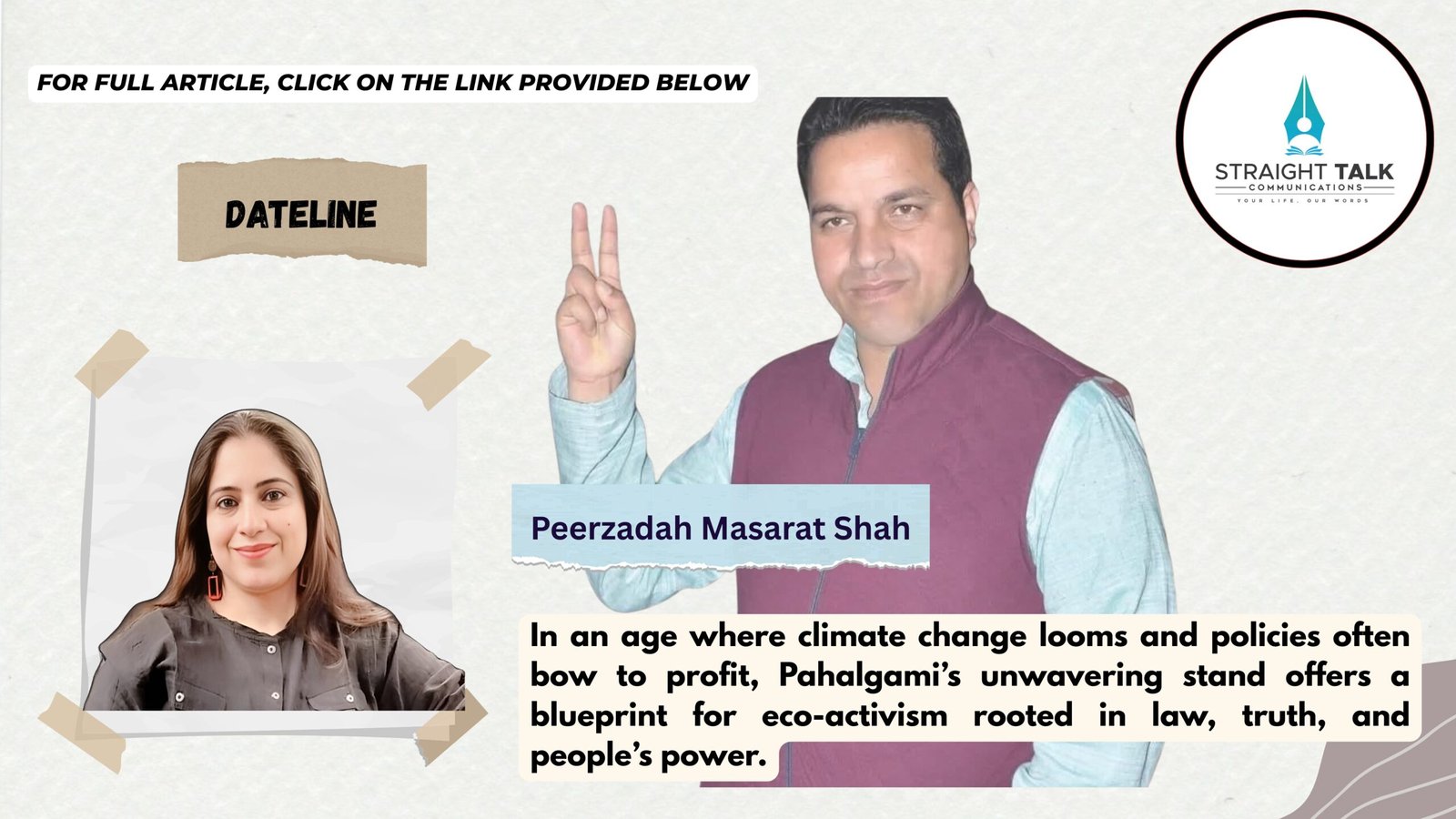One Man Army: Pahalgami fighting for Soul of Himalayas

In an age where climate change looms and policies often bow to profit, Pahalgami’s unwavering stand offers a blueprint for eco-activism rooted in law, truth, and people’s power.
Peerzadah Masarat Shah
In the towering shadows of the Himalayas, where the Lidder River weaves through pine-scented forests and alpine meadows, one voice has risen steadily to protect what remains untouched, sacred, and vital. Mushtaq Ahmad Magrey—better known as Mushtaq Pahalgami—is not just an environmentalist. He is a force of resistance against the slow, silent destruction of Kashmir’s ecological treasures.
As the founder and president of the Himalayan Welfare Organization (HWO), Pahalgami has dedicated his life to safeguarding the fragile ecology of Pahalgam, the Lidder Valley, and beyond. His tools? Legal petitions, RTI activism, public education, and above all, an unshakable belief that environmental justice is inseparable from social justice.
Challenging the Master Plan: The Battle for Lidder Valley
In 2010, a Public Interest Litigation (PIL No. 484/2010) filed by the Pahalgam People’s Welfare Organization (PPWO) challenged the original Master Plan Pahalgam 2005–2025, which sought to “redefine” forest and wildlife zones for commercial exploitation. Though not a direct petitioner, Pahalgami was a central pillar in mobilizing public opinion and media attention around the issue.
This litigation led the Jammu & Kashmir High Court to impose a blanket ban on all new commercial constructions in Pahalgam, a ban that remained until a revised Master Plan (2014–2032) was adopted. But for Pahalgami and HWO, the fight didn’t end there. They continue to advocate for a total ban on commercial development in this ecologically fragile zone, warning of irreversible consequences if greed overrides green.
Forest Land Under Siege: The Legacy of 60-C of 1944
One of the most insidious threats to forest conservation comes from an unlikely villain—Notification 60-C of 1944, a colonial-era order now used to justify illegal land claims. Pahalgami’s HWO challenged its misuse through a writ petition against the 2022 administrative orders of the Divisional Commissioner Kashmir and the Deputy Commissioner Anantnag.
The petition argued that using Notification 60-C to de-notify forest land was a direct violation of the Forest (Conservation) Act, making clear that outdated laws cannot be a veil for land grabs. Pahalgami calls this notification a “legal loophole masquerading as a historic claim” and demands its complete annulment for the sake of Kashmir’s green cover.
Turning the Law into a Shield
Mushtaq Pahalgami doesn’t just protest; he files cases, writes petitions, and demands action. Among his noteworthy legal interventions:
- CM No. 6163/2021: Filed to halt illegal constructions along the Bijbehara-Pahalgam Road. The High Court took notice and directed the Deputy Commissioner to act.
- PIL No. 19/2021: Filed to regulate unchecked tourist vehicles in Pahalgam. The petition sought ecological safeguards and sustainable mobility policies.
- Monitoring Legacy PILs: HWO actively tracks and reports violations of High Court orders in areas like Gulmarg, Sonamarg, and Pahalgam, ensuring that rulings are not reduced to paper promises.
Through these efforts, the law becomes a shield for nature, not a tool for its exploitation.
RTI as a Weapon of Truth
If legal petitions are his arrows, the Right to Information (RTI) is his bow. Pahalgami has filed hundreds of RTI applications under both the J&K and Central RTI Acts to expose:
Encroachments on forest and wildlife lands
Misuse of public funds
Land mafia operations
Unauthorized constructions
Corruption in public works
These documents have empowered court cases, informed journalists, and alerted the public. In the information age, transparency is environmental resistance, and Pahalgami has mastered its power.
Empowering Development Authorities, Not Developers
The Himalayan Welfare Organization has relentlessly advocated for the strict enforcement of the Jammu & Kashmir Development Act, 1970, focusing on:
Section 3: Declaring areas as “development zones”
Section 9 & 10: Empowering CEOs to control land misuse
Section 11: Ensuring Master Plan enforcement
Section 25: Penalizing violators
HWO has also pushed for law enforcement under Section 188 IPC to prosecute violators of environmental and construction bans, reminding authorities that enforcement is not optional—it is legal duty.
From Courtrooms to Classrooms: Grassroots Green Awakening
Pahalgami’s fight isn’t confined to petitions and courtrooms. Alongside legal battles, HWO has led clean-up drives, youth workshops, and school campaigns to educate villagers and students about forest laws, wildlife protections, and sustainable practices.
This public outreach creates a culture of conservation, especially vital in regions where environmental laws are poorly understood or easily manipulated.
Justice for the Voiceless: When Ecology Meets Equity
Mushtaq Pahalgami has made it clear: environmental degradation disproportionately affects the poor. Whether it’s halting hotels on farmlands or stopping roads through orchards, HWO has consistently fought for the rights of local farmers, herders, and villagers. These communities are not just stakeholders—they are stewards of the land.
By helping them file complaints and navigate the judicial system, Pahalgami ensures that development never tramples on dignity.
Conclusion: Legal Resistance is Environmental Resilience
Mushtaq Pahalgami’s work is a reminder that protecting the Himalayas is not a luxury—it’s a necessity. From exposing systemic corruption to stopping illegal land conversions, he has turned the rule of law into a force for nature.
His belief is simple but profound:
The Himalayas are not assets to exploit—they are lifelines to protect.
In an age where climate change looms and policies often bow to profit, Pahalgami’s unwavering stand offers a blueprint for eco-activism rooted in law, truth, and people’s power.
Defending Nature. Empowering Communities. For the Himalayas, Forever.
– Himalayan Welfare Organization (HWO) J&K







